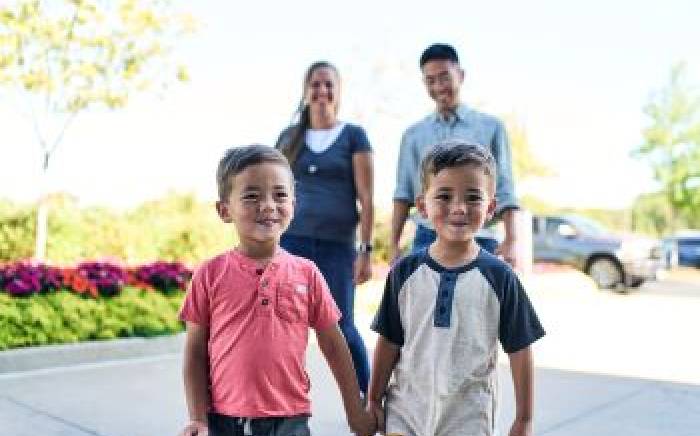About the Arrhythmia Program
If your child has an arrhythmia — an abnormal heart rate or rhythm — you want an expert team to provide the best treatment available. At the St. Louis Children’s and Washington University Heart Center, our pediatric heart specialists treat children with all types of arrhythmias, including the most complex diagnoses. Our multidisciplinary team of specialists will work together to provide a comprehensive range of services for diagnosing and treating your child’s arrhythmia.
.jpg) As one of the first two electrophysiology labs in the country to receive the Intersocietal Accreditation Commission (IAC) Cardiac Electrophysiology Accreditation, this comprehensive pediatric program is led by three full-time electrophysiologists, cardiologists who treat arrhythmias, dedicated to the care of patients with electrophysiology diseases and an experienced, specially-trained pediatric team that includes a dedicated electrophysiology nurse, electrophysiology physician assistant, specially-trained nurses, and anesthesiologists.
As one of the first two electrophysiology labs in the country to receive the Intersocietal Accreditation Commission (IAC) Cardiac Electrophysiology Accreditation, this comprehensive pediatric program is led by three full-time electrophysiologists, cardiologists who treat arrhythmias, dedicated to the care of patients with electrophysiology diseases and an experienced, specially-trained pediatric team that includes a dedicated electrophysiology nurse, electrophysiology physician assistant, specially-trained nurses, and anesthesiologists.
What Is Arrhythmia?
Arrhythmia descri bes a group of conditions related to the heart’s electrical system. Different types of arrhythmias cause the heart to beat too fast, too slow or in an irregular pattern.
bes a group of conditions related to the heart’s electrical system. Different types of arrhythmias cause the heart to beat too fast, too slow or in an irregular pattern.
Some types of arrhythmias result from a congenital heart defect (a heart problem since birth), and others can develop later in life. Those caused by congenital defects can be life-threatening, so it is critical to seek expert care for your child to prevent serious complications.
Arrhythmia Care: Why Choose The Heart Center?
Our arrhythmia program is one of the largest programs in the nation and the largest in the Midwest. We are committed to providing the highest standards in arrhythmia care for your child.
Parents bring their children to The Heart Center for a variety of reasons:
- Broad and deep experience: Because we see such a high variety of cases, we are more equipped than other centers to manage and care for children with an arrhythmia.
- Nationally recognized expertise: Our doctors are world-renowned for their skills and ability in treating arrhythmia, experience that we put to work for the best possible outcome for your child.
- One of two electrophysiology labs in the country to receive the IAC Cardiac Electrophysiology Accreditation.
- Specialized genetic services: For children and families who have a genetic risk of life-threatening arrhythmias, we offer the latest genetic counseling and testing to provide options for treating and managing the condition.
- Trusted experts: We advise pediatric cardiologists around the country, many of whom refer their arrhythmia patients to us because they know we provide the highest level of care and knowledge.
- An innovative approach to care: We are constantly improving our procedures for treating children with arrhythmia, for less invasive procedures and faster recovery times.
Arrhythmia Services We Offer
We offer a comprehensive range of services for diagnosing and treating arrhythmia, including:
Procedures in our innovative pediatric Electrophysiology Lab, such as:
- Electrophysiology (EP) study: An EP study measures the heart's electrical patterns to help assess abnormal heart rhythms or arrhythmias. Our doctors pass tiny electrical wires with electrodes on the ends through the catheter to certain areas of the heart.
- Implantable loop recorder: This tiny device, implanted just under the skin on the chest, measures the heart’s electrical activity for up to three years to help diagnose arrhythmias.
- Pacemakers and implantable cardioverter defibrillators (ICD): We use minimally invasive procedures to implant these devices to control abnormal heart rates and rhythms.
- Radiofrequency ablation and cryoablation: These catheter-based treatments target and treat tiny areas of heart tissue that cause arrhythmia.
- 3-D imaging: We use several types of advanced diagnostic technologies to obtain detailed images of the electrical activity of the heart from all angles. 3-D imaging helps us evaluate the heart’s health and function and map the source of arrhythmias.
Non-Invasive procedures in our Electrophysiology Clinic, such as:
- Electrocardiogram (ECG): An ECG done by placing several stickers with attached wires are on your child’s arms, legs, and across the chest to record the heart’s electrical activity.
- Holter Monitor: This is used to monitor the heart over a longer period of time than a single ECG. The portable device is used to monitor a child’s heart rhythm over 24 to 48 hours.
- Pediatric Exercise Physiology Lab: Where patients who have exercise-induced symptoms have electrocardiogram (ECG) recordings obtained while performing physical exercise, such as on a treadmill or bicycle.
- Tilt table testing: This test may be done if your child faints often. The test checks your child’s heart rate and blood pressure as he or she changes position.
- Device Checks: Patients with pacemakers and intracardiac defibrillators need device checks by physicians who are current with the latest technologies and programming to provide your child with their optimal settings.
Inherited Arrhythmia Clinic
The Inherited Arrhythmia Clinic is a multidisciplinary clinic for patients who may have life-threatening arrhythmias in their family. In addition to being seen by a variety of cardiac specialists, we also offer special genetic testing to help you learn about your child’s risk and counseling for patients and families.
 Our team provides state-of-the art, compassionate care for patients and families with inherited heart rhythm conditions, such as:
Our team provides state-of-the art, compassionate care for patients and families with inherited heart rhythm conditions, such as:
- Long QT syndrome
- Catecholaminergic polymorphic ventricular tachycardia (CPVT)
- Brugada syndrome
- Hypertrophic cardiomyopathy (HCM)
- Arrhythmogenic cardiomyopathy (ACM)
- Short QT syndrome
- Family history of sudden cardiac death
Our goal is to ensure that your family feels empowered and knows that they are not facing this diagnosis alone. Our specialized team will work with your family as a whole to help guide your child and any affected family members through their diagnosis and treatment.
Learn more about one family’s experience with the Inherited Arrhythmia Clinic
For additional information or for your child’s referral by their primary cardiologist, have your primary cardiologist contact Children’s Direct at 314.454.KIDS (5437) or 800.678.5437.
Resources:
To learn more about pediatric electrophysiology, visit:










